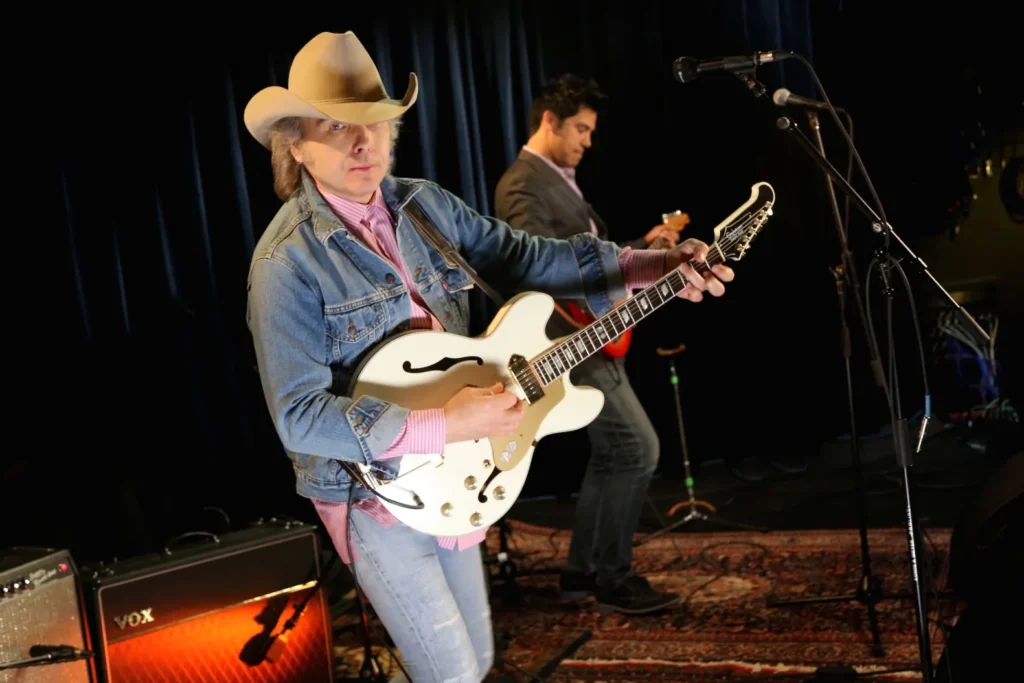
A slow two-step with the truth—a hurt you can’t outdrink, set to a backbeat that keeps you standing even as the room tilts.
Essentials up top. Song: “This Drinkin’ Will Kill Me.” Artist: Dwight Yoakam. Album: Hillbilly Deluxe (Reprise), released July 7, 1987; producer: Pete Anderson; studio: Capitol Studios (Hollywood). Writer: Dwight Yoakam. Length: 2:35. Placement: album closer; not released as a single (the album’s four U.S. singles were “Little Sister,” “Little Ways,” “Please, Please Baby,” and “Always Late with Your Kisses”).
One reason older ears lean toward “This Drinkin’ Will Kill Me” is its plainspoken courage. Yoakam isn’t showboating; he’s telling on himself. The lyric reads like a note scrawled on a diner napkin after the bar has closed: the confession that heartbreak and habit have become the same thing, and that the next round won’t fix either. He sings half a breath behind the beat, the way people talk when they’re trying not to crack, and the hook lands without theatrics—just a line you can live inside: a man who knows the bottle is winning.
The band keeps the floor steady and merciful. This is the Bakersfield toolkit, sharpened for late-’80s radio: snare and kick in a no-nonsense pocket, Telecasters answering in short phrases, and Tom Brumley’s pedal steel sighing in the margins (yes, the same Brumley who lit up Buck Owens records). Around them are Yoakam’s long-time road-and-studio hands—Pete Anderson on guitar and six-string bass, Greg Leisz on lap steel, JD Foster on bass, Jeff Donavan on drums, Brantley Kearns on fiddle, Skip Edwards on piano, with harmony lifts from Herb Pedersen—all documented on the album’s personnel rolls. The parts don’t grandstand; they serve the line.
There’s a little origin story tucked inside the discography, too. Yoakam had demoed the song in Los Angeles in 1981, years before his major-label break, and chose to close Hillbilly Deluxe with it—a decision that gives the LP a last page written in his own hand. That early demo later surfaced officially on the 2006 deluxe edition of Guitars, Cadillacs, Etc., Etc., a neat breadcrumb for anyone who likes to hear how a song finds its final shape.
Context deepens the ache. Hillbilly Deluxe had the hits that kept the dial bright—“Little Sister” and “Little Ways” snapping like neon—yet Yoakam ends the record with this small, fatalistic confession. It reads like a curtain call: after the bravado and the fast steps, here’s the cost. Sequencing it as the closer also fits the old 45-rpm ethos Yoakam loves—state your case, then leave the room before the spell breaks. And while “This Drinkin’ Will Kill Me” never chased chart ink, the surrounding facts hold steady: the album went to No. 1 on Billboard’s Top Country Albums, with four Top-10 singles carrying the set. This track’s job is different—it’s the truth that explains the party.
Musically, notice the economy. Anderson’s production stays dry and close, the way those California records did at Capitol: guitars you can practically see, drums that refuse to hurry, a vocal framed like a portrait instead of a billboard. At 2:35, the performance honors country’s old timing—say your piece and step aside. The melody never strains for catharsis; it settles, which is exactly what a weary admission should do.
And the meaning? It’s not an outlaw swagger or a neon-sad novelty. It’s accountability, sung in the language of honky-tonks and kitchen tables. Anyone who has ever tried to drown a feeling will recognize the paradox at the song’s center: you can numb a wound until you can name it, but the naming is the only way out. That’s why the chorus stings and comforts at once. The title promises doom; the performance offers company. You don’t hear a man giving up; you hear a man finally telling the truth in a room where the band keeps time so he doesn’t falter.
For the sleeve-note crowd: confirmed credits list Yoakam as sole writer, Pete Anderson as producer, Capitol (Hollywood) as the studio, and the personnel above across the album—including Brumley and Leisz on steels. Track listing shows “This Drinkin’ Will Kill Me” as Track 10 and the album closer, with the length posted at 2:35. The early 1981 demo appears on the 2006 Guitars, Cadillacs deluxe alongside other pre-deal recordings; AllMusic and MusicBrainz both index the cut with Yoakam as composer.
Put it on now and you can feel the years compress: the soft click of a needle, the way late-night light looks on a tabletop, the hush that follows a line you’ve been avoiding. “This Drinkin’ Will Kill Me” isn’t a stunt or a sermon. It’s a two-minute reckoning with a little swing in its step—just enough rhythm to carry a hard truth from the bar back to the car, and home.